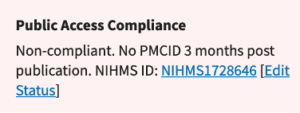Submitting an NIH award progress report (or Research Performance Progress Report (RPPR)) that cites publications failing to comply with the agency’s public access requirement can cost PI’s time and money. Minutes following the submission a non-compliance notice is issued to the PI’s email inbox. The notice, which is shared with the award’s NIH program officer (PO) as well as the University’s signing official (SO), freezes the RPPR process.
To fix the notice and allow the stalled RPPR to be processed, PI’s need to bring each of these publications into compliance and provide proof to the NIH. Failure to do so could lead to the award being cancelled.
This is a serious situation, but one that PI’s can successfully navigate by following a few simple steps:
1. Determine each non-compliant article’s submission status
To determine an article’s submission status, PI’s should check the citation on their NCBI My Bibliography and see if it has been submitted to the NIHMS. Articles without an NIHMSID number in the Public Access Compliance field of the citation may not have been submitted.

Check the NIHMS system (https://www.nihms.nih.gov) to see if and where the paper is in the submission process. Warning: the NIHMS system does not always allow individuals who are not a party to the submission to see the article’s status. If you are unable to see the status, check with the Public Access Service (PAS) at publicaccess@wisc.edu.
2. Contact the authors. Contact the journal. Submit, if necessary.
If an article has not been submitted, PI’s may want to reach out to the article’s authors to see if they would be willing to submit the article to the NIHMS. PI’s can also reach out to journals to see if they have a policy of submitting accepted manuscripts to the NIHMS. If the authors or journals will not submit, the responsibility falls on the PI’s associated with the paper through an award. They will need to submit a copy of the accepted version of the paper along with all figures, tables, and supplementary information through the NIHMS.
Alternatively, PI’s can use the PAS BuckySubmit tool to have articles reviewed and submitted to the NIHMS.
3. Wait for the PMCID
Once an article has been submitted to the NIHMS and received two approvals from a designated reviewer—an associated author or PI—it is uploaded into PubMed Central and receives a PMCID. The NIHMS submission process takes roughly 4-6 weeks. Articles already cited in the PI’s My Bibliography and linked with an award will automatically change to compliant when a PMCID is issued.
4. Generate a PDF Report (aka, Proof)
Once all articles linked to a specific award are compliant on the PI’s My Bibliography a PDF report can be generated.
Here’s how to create a PDF Report:
-
- Log into your My NCBI My Bibliography
- Click on Filter citations and select an award > Click on the Awards Filter > You should only see those citations linked to the award selected
- Click the radial at the top of the list selecting all articles
- Click on Manage citations then the Compliance Report (PDF) link
- A pop-up box will ask you to enter the PI’s name and starting page number, if necessary. Click on the Download PDF button to generate the report.
Review the report to ensure that all previously non-compliant citations have a Complete status.
5. Submit the PDF report to the NIH
To provide evidence of compliance to the NIH, the PI will need to either 1) reply to the non-compliance notice email with the PDF Report, or 2) ask their SO to provide a copy through a PRAM (Progress Report Additional Materials) link available through the PI’s eRA Commons account. Notices typically indicate the NIH’s delivery preference.
In some instances, the award’s program officer (PO) or grants management specialist may request that PDF reports be sent directly to them.
6. Time’s up
The NIH may request that PI’s provide proof of compliance before an article has made it through the NIHMS. In these cases, it is highly recommended that the PI contact the award PO directly to explain the situation as soon as possible. If the article has already been submitted, the PO may waive the PDF report requirement or delay its deadline.
∼
Finally, keep in mind that the best way to deal with non-compliance notices is to avoid situations that cause their creation. The PAS has a long history of working with PI’s and research administrators in keeping publications compliant. Contact us today at publicaccess@wisc.edu to see how we can assist you.